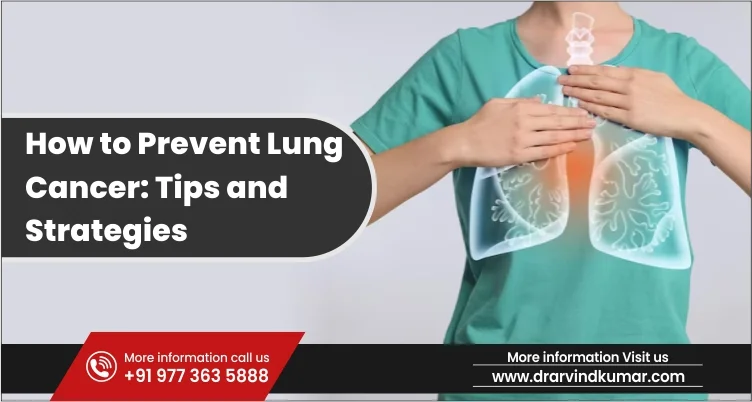There is no foolproof way to completely guard against getting cancer. However, you can make numerous actions and decisions as part of lung cancer prevention to lower your risk of developing lung cancer.
Quitting tobacco, or not smoking in the first place, is one of the best ways to reduce your cancer risk and improve your overall health. However, additional elements might contribute to the prevention of lung cancer.
This article will explore some tips & strategies you can take up as Lung cancer prevention strategies to help lower your lung cancer risk. Let us look into these.
-
Quit Smoking
Lung cancer was a relatively uncommon condition at the beginning of the 20th century. Its dramatic rise is largely due to increased smoking rates among people. Smoking or exposure to tobacco smoke is thought to be a contributing factor in about 90% of lung cancer cases today.
Smoking increases your risk of developing lung cancer in women by 25.7 times and in men by 25 times.
To quit smoking is one of the best ways to prevent lung cancer. According to research, quitting smoking may lower your risk of lung cancer by 30 to 50 percent after 10 years compared to people who do not quit smoking.
If you smoke, discuss the best way to stop with your doctor. Finding a strategy that works for you may take some time, but giving up smoking will greatly benefit your general health.
-
Get Regular Exercise To Prevent Lung Cancer
Physical activity may lower the risk of lung cancer by up to 20% for women and up to 50% for men, according to studies. Exercise appears to reduce your risk more and more the more you do it.
Exercise to prevent lung cancer strengthens your lungs and helps them work more efficiently. Your heart pumps more blood through your body when you exercise, and your lungs work harder to provide the additional oxygen your muscles require.
As a result, your lungs become stronger and more effective at absorbing oxygen and expelling carbon dioxide from your body over time.
Regular exercise to prevent lung cancer also aids in lowering inflammation throughout the body, including in the airways.
Exercise also boosts your immune system and lowers inflammation, which may help shield you from lung cancer.
Even if they smoke, people who engage in regular exercise to prevent lung cancer have a lower risk of developing it, according to some studies.
Exercise has many advantages outside of lung cancer prevention. It can assist you in maintaining a healthy weight, lowering your blood pressure, lowering your risk of heart disease and stroke, and enhancing your mental well-being.
-
Eat A Healthy Diet
You have undoubtedly heard that maintaining a healthy diet is the best advice, but how does this approach specifically make it a preventive lung cancer diet?
A healthy, preventive lung cancer diet generally consists of a lot of fruits, veggies, and whole grains. Foods high in antioxidants like vitamin E, lycopene, selenium, and beta-carotene may help prevent lung cancer.
Your chance of developing lung cancer may be decreased by eating a healthy diet high in fruits and vegetables. Prevention of a lung cancer diet, rich in fruits and veggies to help prevent lung cancer in both smokers and non-smokers, according to some research.
Saturated and trans fats, cholesterol, sodium, and added sugars should all be kept to a minimum in a nutritious diet. Eating too many foods in large amounts can raise your chance of developing lung cancer because they reduce lung cells efficiency and resilience.
-
Talk To Your Doctor About Lung Cancer Screening
Regular lung cancer screening may be beneficial for you if your smoking history and age put you at a greater risk of developing lung cancer. Early detection through lung cancer screening may make it simpler to treat.
The only test for lung cancer screening that is presently approved is the low-dose computed tomography (CT) scan, which provides a detailed image of the lungs while using only about one-third the radiation dose of a full-dose CT scan. It only takes a few minutes and does not require any shots or tools. Positive lung cancer screening tests may be followed by extra scans and testing, and then an assessment by a multidisciplinary team.
The only individuals for whom screening is advised are those with a high risk of lung cancer. Speak to your doctor if you believe you might be possibility for lung cancer screening to find out more.
-
Learn About Your Familys History
You may have a two to three times greater chance of developing lung cancer than individuals without a family history if an immediate family member (such as a parent or sibling) has the disease. Environmental and genetic variables both play a role in this elevated risk.
Make sure to notify your doctor if any members of your immediate family—smokers or nonsmokers—develop lung cancer. They might advise specific lung cancer screening to help lower your chance.
Conclusion
There are many things you can do for lung cancer prevention & to reduce your chance of developing lung cancer. Many of these protection techniques, such as quitting smoking, engaging in regular exercise, and adhering to a healthy diet, can enhance your general health in numerous ways.
Consult your doctor if you have concerns about your chance of developing lung cancer and what you can do to reduce that risk. They might recommend tests or other measures to help reduce your chance.
Frequently Asked Questions
Can someone who does not smoke develop lung cancer?
Yes, due to exposure to polluted air, which has many of the carcinogens present in tobacco. Smoke, last decade has witnessed an unprecedented increase in incidence of Lung cancer among non-smokers. It is affecting people at younger age group, both males as well as females.
Can lung cancer be seen on a chest X-ray?
X-rays are not as effective as CT scans for detecting lung tumors, particularly in their early stages. An X-ray may not be able to detect a tumor because it is too small or because other bodily structures are blocking it. (like your ribs). X-rays cannot identify lung cancer; they can only alert your healthcare practitioner to any suspicious findings that require further investigation.
What drugs or treatments are used to cure lung cancer?
Surgery, radiofrequency ablation, radiation therapy, chemotherapy, tailored drug therapy, and immunotherapy are all options for treating lung cancer.

.webp)



